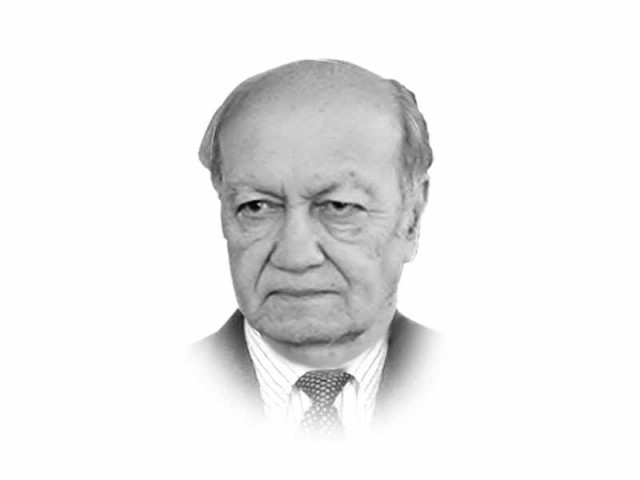From eternal rivalry to a productive relationship?
Improvement in India-Pakistan relations can be a game-changer for Pakistan and the region

The writer is a retired lieutenant general of the Pakistan Army and a former federal secretary. He has also served as chairman of the Pakistan Ordnance Factories Board
But with India, it is a different story. Despite Nawaz Sharif’s sincere efforts at breaking the deadlock, India’s intransigence continues. It has taken the stance that unless Pakistan makes good on its commitment to pursue the case against the perpetrators of the Mumbai carnage, there will be no serious engagement. In the last few months, however, there have been feeble attempts on both sides to break the stalemate. When Pakistan took a position that as it was India that had suspended the dialogue, it should take the initiative of re-engaging with us, the BJP government took the hint and under the umbrella of Saarc, the Indian foreign secretary visited Islamabad. In the absence of any follow-up, Nawaz Sharif, in an interview to the Saudi media recently, expressed his deep frustration over the lack of reciprocity on the part of the Indian government to Pakistan’s overtures.
It is, however, important to appreciate that Prime Minister Narendra Modi is basing his hardline attitude on the premise that Pakistan continues to support the Lashkar–e-Taiba (LeT) or its new incarnation and gives protection to the very group that has committed the Mumbai carnage.
The Mumbai controversy is a symptom of the complex relations between the two countries. It is also an expression of the inner contradictions within the power structure of Pakistan that New Delhi fully exploits to its advantage. For Islamabad to keep on harping that the military and civilian leaderships are on the same page on foreign policy issues, and especially as it relates to India, will be a travesty of judgment. We also need to acknowledge that India has made progress on the Mumbai case a litmus test of our sincerity towards normalising relations. Consequently, a more sophisticated approach in redressing New Delhi’s genuine grievances will have to be adopted. One appreciates that Pakistan’s military, which is already stretched to its limit fighting on three fronts, cannot be expected to open another new front and confront the LeT at this juncture. But the question is, even if Pakistan were to largely overcome its internal threats, would its policy be any different if the military continues to monopolise power? Ironically, the current reality is that a deteriorating relationship compels Pakistan to focus on India rather than fully concentrate on its primary threat emanating from insurgencies. Besides, in a tension-ridden environment, any militant incident, by design or by default, could escalate into a dangerous scenario between the two nuclear-armed neighbours. The more immediate impact of this rivalry would be on the stability of Afghanistan and the region.
All this leads to the conclusion that a confrontational relationship with India in the longer term would be self-destructive. All the gains that are supposed to accrue from improved relations with China and other major powers as a consequence could be diluted.
The establishment’s dominance in influencing policy towards India complicates matters. On the one hand, the military’s preoccupation with fighting on multiple fronts detracts from opening another one with India. But the establishment is also fiercely opposed to Nawaz Sharif making any significant overtures towards normalisation. Its only interest is that the relations remain at a tactical level where there is no war and no peace, a situation that in the long term is untenable. In fact, its reaction to Nawaz Sharif’s peace initiatives in the first year of his assuming office were so strong that it would not have hesitated in destabilising the government if he had unilaterally continued on that path. The earlier moves by Nawaz Sharif to grant the MFN status to India were looked at with great disdain and blocked. As of now, there is a common perception that narrow institutional interests are a major impediment for Nawaz Sharif to proceed on a conciliatory path with India. In such a situation, the Indian leadership perhaps, considers it futile to respond to the prime minister’s overtures when it knows that it is not him but the establishment that dictates relations with India and is blocking any initiatives towards moving forward. The previous Congress government in India advanced a similar argument to maintain the stalemate.
Relations with India, apart from having a direct impact on regional peace and economic progress, also directly influence civil-military relations in the negative. Modi takes full advantage of this by maligning Pakistan for the dysfunctional civil-military relations and uses these as a cover for his hard policy towards Pakistan. What is generally overlooked is that this hard position enables India to keep suppressing the Kashmiris. The international community looks the other way as the commercial and strategic interests of the West take precedence over human rights and universal principles of justice. On the contrary, in Pakistan, the beneficiaries of New Delhi’s belligerence are the jihadi groups. They widen their support base by highlighting India’s injustices in Kashmir. In both scenarios, it is Pakistan that is at a loss as the jihadi elements are destabilising it internally and projecting a negative image of the country internationally.
Improvement in India-Pakistan relations can be a game-changer for Pakistan and the region. This will require a qualitative change in mindset and policies, which regrettably as of now, are not on the horizon.
Published in The Express Tribune, May 6th, 2015.
Like Opinion & Editorial on Facebook, follow @ETOpEd on Twitter to receive all updates on all our daily pieces.














COMMENTS
Comments are moderated and generally will be posted if they are on-topic and not abusive.
For more information, please see our Comments FAQ